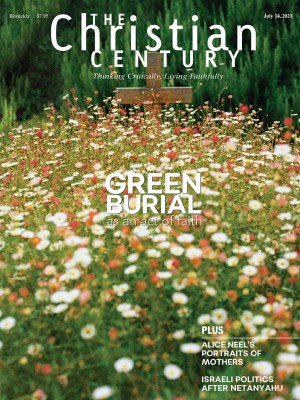August 1, Ordinary 18B (John 6:24–35)
“Trust me!” Jesus says, and the more he says it, the less the crowd is inclined to go along.
There’s an old XKCD comic strip in which creator Randall Munroe explains why he tries not to make fun of people when they admit they don’t know something. “If I make fun of people,” he writes, “I train them not to tell me when they have those moments. And I miss out on the fun”—on the delight in others’ discovery.
After the umpteenth iteration of “he was in the world . . . yet the world did not know him,” one might be forgiven for wishing John could adopt Munroe’s attitude. The story of the crowds searching for the bread of heaven is yet another in which Jesus and his interlocutors talk past each other. It’s cringe-inducing, honestly. The people don’t understand because John doesn’t set them up to understand because this suits his book’s theme. Only a few of them, like Nicodemus, are recognizable as individuals. Mostly they are less their own characters than members of the chorus with an occasional solo line, dramatizing yet again John’s point that the world just didn’t get Jesus. Whatever initial charm there is in knowing more than they do quickly fades. As Munroe grasps, there’s only so much fun in slapping the dopes.
Read our latest issue or browse back issues.
As he usually does, John ties the conversation in knots about signs and belief and misperceptions of who Jesus is and what his work means. The through line is that “the food that endures for eternal life,” or the bread of heaven, was a common figure for Torah in Jesus’ day. As bread feeds the body, so God’s ethical teachings feed the soul, and Jesus promises to make this spiritual bread accessible to all who want it. There’s just one hitch. The bread of heaven is Jesus himself, and to receive it, the crowd must believe that he has been sent by God to feed them with his own body and blood.
Maybe John missed a miracle here, which is that after talking to Jesus no one ever died of whiplash.
There’s a reason I seem scornful of the way John sets this story up. In contemporary American culture, belief is everything. Our beliefs, as expressed in the political philosophies with which we agree, define everything from where we live to who our friends are to which diseases we acknowledge as real. The way we see the world seems immediately, instinctively obvious, and it is easy to feel contempt for those who cannot see what we consider plain as day.
This is especially so if the theories are correct that beliefs are shaped by frameworks of moral perceptions that we carry around in our heads. In that case, the people who disagree with us aren’t just incorrect, they’re immoral.
Even worse, too many of the modern crowd have come to rely on signs of misinformation, disinformation, and conspiracy theories. “Everything is a facade,” said one vaccine refuser to the New York Times. This crowd feels lost and endangered without a prophet to give them the secret information about what is really causing the world’s problems. Perhaps the crowd that stands before Jesus is not so different from our own. Maybe they follow him less for the bread than in the hopes that he might give them the inside scoop that helps them take control of their lives.
It’s no wonder the crowd turns on Jesus, then. He doesn’t know how to string them along until they’re hanging on his every cryptic word. He pushes too hard too fast and backs them into a corner. To accept Jesus’ proposition, to believe in him in the way John wants, will force them to admit that they have been foolish up to this point. That serves John’s narrative and theological purposes, but it is the opposite of motivational. “Trust me!” Jesus says, and the more he says it, the less the crowd is inclined to go along.
John’s idea of what it means to believe is far different from ours in our scientific, post-Enlightenment world, of course. It’s not assent to an intellectual proposition the apostle is after, it’s that his readers come to better know Jesus, the bread of heaven. The relational aspect finally saves the story from itself. Even as the author fumes about the crowd’s blindness, his main character invites them into relationship. Jesus, ever the teacher, wants to see the light in their eyes as the world opens up before them. He knows there’s no margin in making them feel stupid.
The leader of an immunization advocacy group recently told me it’s well known in that world that you simply cannot argue someone into taking the necessary steps for public health. They may listen to the logic and consider the evidence, but if they’re skeptical, it all goes in one ear and out the other. The only thing to do, in her words, is to offer them “positive feelings strong enough to outweigh the bad.”
The thing to do, then, is to show people “that which comes down from heaven and gives life to the world” by listening to them, taking them seriously, and building a relationship. In encouraging vaccination, avoid the temptation to scoff at plain ignorance and recalcitrance. In reading John, stop demanding that people think the same way we do. It doesn’t always work—people can be pretty stubborn, after all—but when it does, it brings the joy of watching someone realize for the first time how wonderful and strange life is in the light of God’s love. Why would you want to miss out on that fun?






